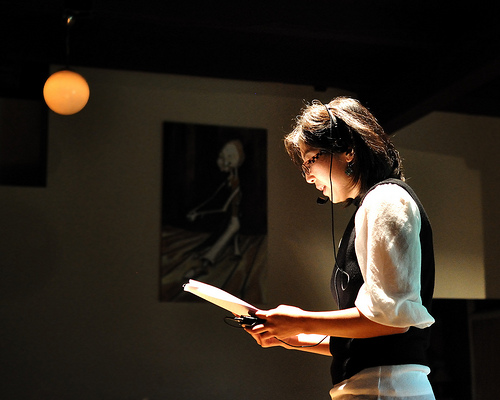
I mentioned in my last post that I was planning to check out an event on December 4th called Breaking English, hosted by Korean-Brazilian writer Larissa Min. Larissa moved to Seattle in 2000, where she got her M.F.A. in fiction at the University of Washington. Since then, she has taught at local community colleges and begun work on a family history project mapping her parents’ journey from Korea to Brazil, and several decades later, to New York City. Her research, sponsored by the Seattle Office of Arts and Cultural Affairs, has taken her back to Brazil, down the streets of her hometown, and into the archives of her childhood library.
I arrived at the event a little late, but found a great seat as Larissa assured the audience that she was running on “Latino time” and would be ready in a few minutes. I felt immediately gratified to be in the company of what seemed to me a different crowd than the one that usually frequents Seattle literary events (where I am often the only person of color present!) The unusual venue, a darkened second-floor dance studio in Seattle’s Capitol Hill district (known for its arts community), was a lovely event space: floor-length mirrors, wood pillars, votive candles flickering on the hardwood, white paper bags glowing luminously along the back wall of the studio…
Larissa established a wonderful rapport with her audience, at times reading from her manuscript-in progress, at times moving into a more conversational mode and talking through a presentation of images and newspaper clips. I appreciated the fluidity with which she transitioned from one performance genre to the next; one moment she was crouched on the floor with a Korean drum, and the next she was laughing at a childhood photo of herself making faces at the camera. All throughout the evening, her wonderful and quirky humor (a photo of a prancing unicorn popped on the screen when she described her surprise at finding a fellow Korean during her travels to the southernmost tip of Brazil), moved her audience to laughter and, at more serious moments, tinged some of her family’s most painful experiences with a poignance I found tremendously beautiful.
The selections Larissa shared from her manuscript-in-progress were excerpted from three different periods of her family’s life: first, her parents’ courtship and preparation for their move to Brazil, which they undertook with fifty other Korean families after negotiating an agreement with the Brazilian government. Next, her family’s settlement in Brazil, and the strangeness of encountering a wholly new terrain and culture that, over time, became home. In her final selection, she narrated an episode from her family’s first few years in New York, allowing the quality of the reading to take on a more personal tone as she wove story from the conflicted relationships of a family in transition. I thoroughly appreciated Larissa’s narrative adeptness, evident not only in her written texts, but in the variety of voices, modes, and media she evoked over the course of the evening. What a fantastic event!